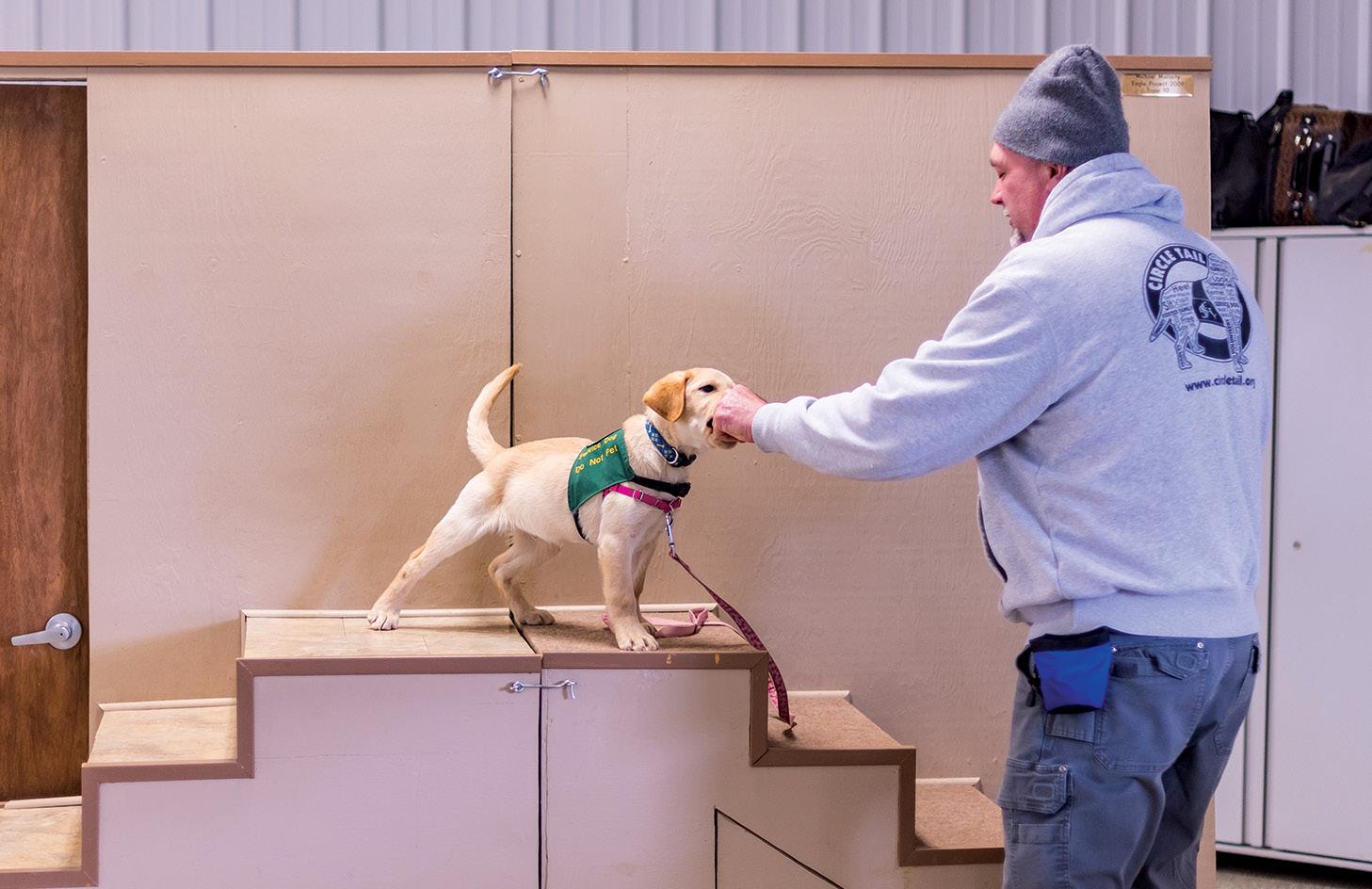
6 minute read
Circle tail: serving dogs and people
Promoting the human-canine bond through training
BY SUSANNAH MAYNARD
Advertisement

About 30 miles outside of Cincinnati, nestled in the Warren County countryside, is the sprawling 17-acre complex that encompasses Circle Tail. Founded in 1997 by Marlys Staley, Circle Tail is a nonprofit organization that is on a mission to provide service and hearing dogs to people with disabilities at no cost to them. In addition to providing service and hearing dogs to individuals with physical disabilities, diabetes, or those who are hard of hearing, Circle Tail also promotes the humancanine bond by providing low-cost dog training services, educational programs, and first-aid classes for people and their pets. Classes offered by Circle Tail vary from individual and group obedience training classes to nosework training. Nosework training teaches dogs how to search for a specific odor and find the source. AKC Canine Good Citizen Testing is also periodically offered throughout the year.
Staley, a physical therapist by profession, was inspired to change careers after visiting a guide dog training center in Florida and learning of the need for more assistance dogs. She started the facility on her Pleasant Plain property where she still lives today and serves as the organization’s executive director. Over the years, the organization has grown both in size and service, physically outgrowing the original facility—Staley’s barn—and its current 7,200-square-foot facility. Today, Circle Tail is building for the future. Their new, approximately 10,500-square-foot facility will house their adult dogs in 36 kennel spaces, as well as provide a comfortable space for their staff and volunteers. The new building will also increase their capacity for training more dogs and thus helping more people.
Dogs in the training program are trained on site at Circle Tail’s facility and through the prison dog training program in partnership with the Ohio Reformatory for Women and the Dayton Correctional Institution. The Inmate/Canine Educational Training Program began in 1998 at the Marion Correctional Institution. Inmates are provided regular instruction by Circle Tail trainers on caring for and training the puppies/dogs. Inmates tend to both the physical and emotional needs of the dogs under their care and are with the dogs 24/7 except for meal times. While the dogs are in the prison training program, all of their care is performed by the inmates, from feeding, grooming, and exercise to training in basic manners and advanced obedience. Dogs in training are then placed with foster families where they are socialized around everyday experiences that they don’t get through the prison program. The foster families work with the dogs in their homes and out in public to make sure they are
TOP: Construction is underway on a new facility. ABOVE: Caden awaiting training.


using their advanced service skills. When the dogs aren’t in foster care they are housed on site at the Circle Tail facility, where they are cared for on a daily basis by staff members and volunteers. They participate in daily training activities and frequently go on outings to gain exposure to real-world situations.
Circle Tail’s dogs come from donations from families or breeders or may come from shelters or rescues, provided they have the temperament to be a service dog. Recently, Circle Tail has started their own breeding program with stud Braxton, a 2-year-old black lab. Several of the puppies he sired are in the early stages of their training program. In order to be a service dog in training, dogs must get along with people of all ages, as well as other dogs and cats. Each dog is rigorously evaluated prior to entering the training program. While Labs, Goldens, and German Shepherds often make the best service dogs, Circle Tail doesn’t focus on the specific breed as much as they do on making sure the individual dog has the right temperament to be a service dog. Puppies are evaluated at an early age and can generally be weeded out very quickly depending on how they react to different situations they are presented with. If a puppy is a good fit for the program, their training starts with socialization activities and progresses to short snippets of training time prior to entering the prison training program and foster care.
Jocko and Caden are just two puppies in training that were sired by Braxton. They are both 3 months old and just starting out on their training journey, which will take several years to complete. Their mom, Jaylah, a 3-year-old Golden Retriever, is


Circle Tail’s on-site training facility with a variety of equipment to train the dogs to navigate steps, doors, and drawers.

also in training to be a service dog. Typically, dogs are placed into service with an individual at around 2 years of age, but Jaylah is older because she had her litter of puppies to tend to.
A lot of training takes place at Circle Tail’s on-site training facility. The dogs learn various commands and are trained to complete tasks that they might need to perform to assist their handler. The training center has a variety of mobility equipment and even a set with steps, doors, and drawers. The set helps dogs learn how to navigate steps with their handlers, as well as how to open and close doors and drawers. Jaylah demonstrated her skill at retrieving a pill bottle from a drawer, a task a service dog may have to perform regularly for their handler. Dogs that are ready to go to a handler are matched up with a handler based on skills and need and then work with the handler for a period of time before finally being placed. This is to make sure that the handler and the dog are a good match and so the handler has the knowledge to work with the dog and maintain their training standards.
Not all dogs that enter the training program end up being fully trained service dogs for a variety of reasons, from medical conditions to behavioral or temperament issues that make them not suitable as service dogs. Dogs with a short attention span or dogs that are easily distracted end up not being good service dogs, as service dogs need to be fully attentive to their handler and focused on the tasks they need to perform. These “career change” dogs as they are called are available for adoption to the general public, but you’ll need to add your name to a waiting list, as they are in high demand. Last year Circle Tail adopted out around 45 career change dogs. At any given time they have approximately 50 dogs in training, with about half of those in the prison program, another 10 or so in foster homes, and the remaining being housed at Circle Tail’s facility. Circle Tail has approximately 50 active volunteers, from fosters to board members to those who walk dogs at the facility or help out at fundraising events. Volunteers who handle or foster dogs go through a training program prior to working with the dogs.
While Circle Tail provides dogs to recipients at no cost to the recipient, the fully trained dogs cost Circle Tail around $17,000 each. As a nonprofit organization, Circle Tail is funded by donations from the public, grants, adoption fees from career change dogs, public training class fees, and monies raised from fundraising events. The organization’s largest fundraising event, “Dinner, Art, and Wine for Canines,” takes place on Saturday, March 21, at Receptions in Loveland. This year marks the 10th year for this event and it’s all about new beginnings, with keynote speeches from inmate dog handlers on how participating in the inmate/canine program has changed their lives. Tickets to the event include wine-tasting, a dinner buffet, open bar for beer and wine, silent and live auctions, puppy meet-and-greets, and raffle prizes. Tickets for the event are $70 each or $130 for two. For more information or to order tickets, visit Circle Tail’s website: circletail.org. CP





